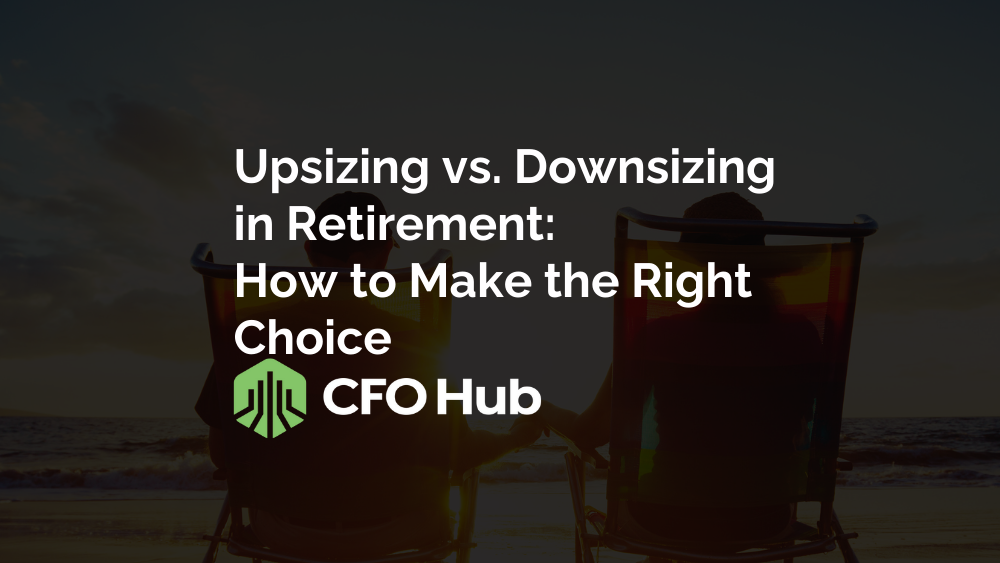Upsizing vs. Downsizing in Retirement: How to Make the Right Choice
Setting out on the retirement journey reveals a universe full of opportunities, especially when it comes to moving homes and changing your way of living. It becomes crucial to consider whether expanding your home for more room and variety or choosing to downsize your living space for more efficient living and financial responsibility, is more appropriate for your retirement.
This is a turning point that will have a significant impact on your psychological balance, financial stability, and existential rhythm. In order to guide you toward a choice that is consistent with your anticipated retirement goals, allow us to examine five crucial factors.
Think About Your Financial Circumstances
If you decide to upgrade or reduce the size of your home, you will need a sizeable savings account to support your choice. You can look into personal loans, or a more feasible option such as a reverse mortgage if you have a home with significant equity. With this financial move, you can convert a portion of the equity in your home into liquid assets. You can choose to get your money in the form of an outright payment, an accessible line of credit, or a single lump sum.
There are other variations on reverse mortgages, but HECM for Purchase is a particularly good option for people who are thinking about upsizing or downsizing. As a result, this permits borrowers to:
- Use a reverse mortgage to pay up to half of the sale price of a new house, without having to make monthly mortgage payments.
- Combine the purchase of a new home and a reverse mortgage in a single transaction.
- Potentially relocate to a home that better fits their lifestyle, such as downsizing to a smaller property or moving closer to family or amenities suitable for retirement living. For moving services, call Suddath.com.
All in all, HECM loans offer a flexible line of credit or monthly payments by tapping into your home equity, without requiring immediate repayment as long as the home remains your primary residence.
Determine Your Lifestyle Requirements
Consider the retirement you have always wanted. Upsizing may be the way to happiness if you are all about having large family gatherings, engaging in pastimes outdoors, or just enjoying the spaciousness of your home. This would satisfy your need for extra space to gather guests, engage in space-demanding hobbies, or even comfortably host short-term visitors.
But downsizing might be rather freeing if your idea of retirement is simpler, with less maintenance and more time to pursue hobbies outside the home. It’s about making sure your living arrangement supports rather than undermines your ambitions for these golden years by matching the size of your property to your desired lifestyle.
Also, remember, that a crucial factor in the discussion between downsizing and upsizing is financial health. Upsizing has higher initial costs and may not provide a higher quality of life. But don’t forget there are a lot of costs associated with living spaciously. Those costs include upkeep, property taxes, and utility bills. It’s critical to balance these against your income and retirement funds to guarantee a pleasant life, free from debt.
Assess Your Mobility and Health
A larger house provides comfort without having to relocate in the future due to its ability to suit future mobility needs or health-related alterations. However, maintaining it can become a significant effort that may exceed the advantages of having more room.
Relocating to an accessible retirement community or downsizing to a smaller, more manageable home can result in a safer, cozier living environment. It’s wise to think about potential changes to your health, as well as your current state of well-being.
Choosing a house that can adjust to changing mobility and health issues now will save problems later on and guarantee long-term safety and comfort.
Consider the Community and Location
The location of your house is more important than its size. If you’ve always wanted a quiet retirement, and you find yourself in a very populated and busy area, expanding your home won’t mean much to you. During retirement, all that matters is that you get enough rest, and have access to social amenities.
Think about what makes you happy and fulfilled, and then look for a place that supports these things to improve your overall retirement well-being.
Make Future Plans
When choosing between downsizing and upsizing, it is important to look ahead. Even if you currently want a larger home, think about how manageable and useful it will be when you get older. While downsizing can be convenient and cost-effective, consider whether it could eventually seem restrictive.
Making plans for unforeseen events, such as changes in health and the potential need for care, guarantees that your decision will hold up over time. A more secure and enjoyable retirement can result from future-proofing your choice by taking adaptability and accessibility to necessary services into consideration.
Concluding
Choosing to downsize or upsize in retirement is a very personal decision that is influenced by your long-term goals, lifestyle preferences, and financial status. Give these things some thought, and ask loved ones or experts for guidance if necessary. It’s also worth mentioning that more and more Americans are deciding to upsize and enjoy the fruits of their hard-earned labor during their golden years. So, maybe you will want to do the same thing.
Still, it’s important to make a wise decision that will enable you to completely enjoy this new chapter of your life and provide you with happiness, comfort, and peace of mind throughout your retirement years.
Jack Perkins, CPA founded CFO Hub to provide strategic finance and accounting services to enterprises of all sizes. Prior to founding CFO Hub, Jack served as the CFO and Controller of rapidly growing enterprises in California. Jack's written content has been featured in Forbes, Entrepreneur, and several other notable publications.
Visit Jack's Expert Hub to learn more about his experience and read more of his editorial content

